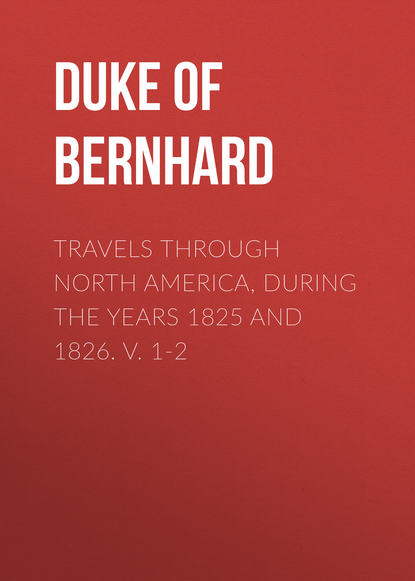По всем вопросам обращайтесь на: info@litportal.ru
(©) 2003-2024.
✖
Travels Through North America, During the Years 1825 and 1826. v. 1-2
Настройки чтения
Размер шрифта
Высота строк
Поля
45
[A plain, unvarnished history of the internal slave trade carried on in this country, would shock and disgust the reader to a degree that would almost render him ashamed to acknowledge himself a member of the same community. In unmanly and degrading barbarity, wanton cruelty, and horrible indifference to every human emotion, facts could be produced worthy of association with whatever is recorded of the slave trade in any other form. One of these internal slave traders has built, in a neighbouring city, a range of private prisons, fronting the main road to Washington, in which he collects his cattle previous to sending off a caravan to the south. The voice of lamentation is seldom stilled within these accursed walls.] – Trans.
46
This Frenchman, a merchant’s clerk from Montpelier, was not satisfied with this: he went to the police, lodged a complaint against the girl, had her arrested by two constables, and whipped again by them in his presence. I regret that I did not take a note of this miscreant’s name, in order that I might give his disgraceful conduct its merited publicity.
47
[Nonsense.] – Trans.
48
[Our author has somehow been confused in his diary here: the mouth of La Fourche is generally called seventy-five miles above New Orleans, Stoddart makes it eighty-one. At any rate it is about half way between Bayou Sara or Point Coupee and the city of New Orleans; and of course the Duke must have passed Donaldsonville, which is at the junction of La Fourche with the Mississippi, in the morning of the day he passed Baton Rouge.] – Trans.
49
In these rivers there is a difference understood between the two kinds of trunks of trees which lie in the stream, and are dangerous to vessels, i. e. snags and sawyers. The first, of which I have spoken already in the Alabama river, are fast at one end in the bottom, and stand up like piles; the others are not fastened, by being moved by the current the upper end of the tree takes a sawing motion, from whence its appellation is derived.
50
Coluber coccineus.
51
[These log turnpikes are better known by the name of “corduroy roads.”] – Trans.
52
[This is, perhaps, the most charitable idea that can be formed of the actions of such reformers, as well as of a “lady” heretofore mentioned, who has unsexed herself, and become so intoxicated with vanity, as enthusiastically to preach up a “reformation” in favour of the promiscuous intercourse of sexes and colours, the downfall of all religion, and the removal of all restraints imposed by virtue and morality!] – Trans.
53
[It is understood that Mr. M‘Clure has long since given up all connexion with the New Harmony bubble.] – Trans.
54
By late newspapers it appears, that the society actually dissolved itself, in the beginning of the year 1827.
55
[According to the report of some females, who were induced to visit New Harmony, and remained there for some time, any situation much above abject wretchedness, was preferable to this vaunted terrestrial paradise.] – Trans.
56
He was drowned in the Wabash, which he attempted to swim over on horseback.
57
[He is at this time advertising a boarding-school in the Western country, on his own account, which is to be under his immediate superintendence!] – Trans.
58
[He has left it some time since, as well as Dr. Troost.] – Trans.
59
These had been presented to Bishop Fenwick by Cardinal Fesch, for his cathedral, and were only here, until they could find their place in the Temple of God.
60
[Brother of Lord Hill.] – Trans.
61
[Peyton Symmes, Esq. receiver of the land office.] – Trans.
62
[Tetrao Umbellus, L.] – Trans.
63
These meadows are designated in America, by the name of prairies, and extend over large tracts of land in the western country; they are covered with high grass; trees grow very sparingly on them, while the surrounding forests exhibit the most beautiful trees; the soil of these prairies generally consists of turf-moor.
64
[The Ohio Eagle.] – Trans.
65
Knopendraayerye.
66
In the year 1826, I enjoyed three springs; the first about the end of February at New Orleans, the second at New Harmony and Louisville, and the third in the state of Ohio, and west Pennsylvania.
67
In this hymn-book are some pieces, which, if the perfect child-like innocence of these maidens be not recollected, might appear rather scandalous. For instance, there is a literal translation of the song of Solomon, among others.
68
[It is to be hoped that the able and luminous report of the commissioners appointed by the state, to make inquiries on the subject of penitentiary discipline, will be sufficient to correct the glaring errors of this new system; which like most of the new systems of the present day, is clearly proved thereby to be more specious than beneficial. The evidence accumulated by the commissioners is of a character to satisfy every candid mind, not chained to the support of a particular theory, that solitary confinement without labour, is unequal in operation, inadequate to the end proposed, and promises to be as destructive to human life as it is discordant to humane feelings.] – Trans.
69
[This is a very erroneous idea. The taste for painting and music has not been cultivated, generally, in this country, on account of the condition of property and society, which demand of Americans a primary devotion to things absolutely necessary and useful. As wealth becomes more accumulated, artists will be encouraged; and then we have no fear of their being long inferior to the artists of any other nation.] – Trans.





